Trying to find the best guitar for a beginner can get overwhelming. So here's a guide to help you forward, without trying to sell you stuff!
Trying to figure out which is the best guitar for a beginner can be a daunting task. There are a lot of options for guitars on the market, and a lot of information on the Internet seems to want to push you in one direction or another just to make a sale.
But Parlor City Sound doesn’t sell guitars (or anything else, for that matter). We just want to see you pick up a guitar and start playing it. So let’s explore the world of low-cost, high-quality guitars to help you find the best guitar for a beginner … and you specifically.
Getting started on your quest to find the best guitar for a beginner might seem overwhelming. But in this guide, we’re going to cover the essentials most guitarists want to know about when they’re just starting out. Do you want an acoustic guitar or an electric guitar? How much does a beginner guitar cost? Which brands make the best guitars for beginners? We’ll cover it all!
Acoustic guitars vs. electric guitars
Probably the first thing you really need to decide is whether you want to start out on an acoustic guitar or an electric guitar. And there’s really no right or wrong answer to this question. It’s just a matter of personal taste and style. Acoustic guitars for beginners are usually friendlier to your wallet. Electric guitars are a bit more versatile where sound is concerned, but they cost more. It’s entirely up to you which you want more. Here are a few notes for you if you’re up in the air:
Acoustic guitars:
- Lighter weight but bulkier/ more cumbersome
- Usually (but not always) thicker necks
- Loud without needing an amplifier (but not as loud as an amplified electric guitar)
- Thicker, less bendable guitar strings
- No other expenses—you don’t need a guitar amp, pedals, cables, etc.
Electric guitars:
- Heavier but with slimmer bodies and necks
- More aesthetic options—there are a lot of different looks and styles for electric guitars
- Playable without an amplifier, but you’ll need that amp if you want to play louder
- Can use it with guitar pedals that manipulate the sound with distortion, reverb, and other effects
- Can get more expensive quickly given the need for additional equipment
Also Read: What’s an ideal humidity level for musical instruments?
Guitar brands: who makes the best guitar for a beginner?
Once you’ve decided which style of guitar to go with, your next question also seems daunting. There are a lot of guitar brands out there. Like, an absurd number of them. So which guitar brands are trustworthy? Which guitar brand makes the best guitar for a beginner?
If there are only two guitar brands you’ve ever heard of, there’s a pretty good chance they’re Fender and Gibson. These two brands have made some of the most iconic guitars of all time, including the Gibson Les Paul and SG, and the Fender Stratocaster and Telecaster.
There frankly aren’t any acoustic guitars as recognizable as those storied electrics, though there are certainly a number of standout brands in the acoustic world. Martin, Taylor, and Yamaha join Gibson and Fender on the list of the most iconic acoustic guitar manufacturers.
There are too many other noteworthy brands to even mention here. Gretsch, Guild, PRS, Rickenbacker, ESP, Schecter … it’s a long list. And some of the “no-name” guitar brands—the ones that aren’t nearly as popular—make really excellent guitars as well. Teisco guitars, for example, were labeled as cheap knock-offs for years, and now guitarists chase them to the ends of the Earth.
At the end of the day, you really can’t tell if a guitar is good or bad based solely on what label is on the headstock. But as a beginner, you don’t really know what specifically to look for in a good guitar. So we recommend just sticking with those established brands out of the gate, and exploring the less popular ones later.
Choosing an acoustic guitar for beginners

A great choice for an acoustic guitar for beginners should play well, sound nice, and be as affordable as possible. Realistically, a good acoustic guitar for beginners will cost somewhere between $150 and $600, and there are countless options at the lower end of that scale, too.
There are a lot of body shapes and styles to choose from, though you shouldn’t really worry about that much. Just don’t get a classical guitar, and we’d advise against beginners getting parlor and jumbo guitars, too. Dreadnoughts are sized and scaled well for learning, and have a more standardized sound as well. Auditorium and grand concert acoustics should work for you too.
Some of the brands making excellent acoustic guitars for beginners these days include (alphabetically):
- D’Angelico
- Epiphone
- Gretsch
- Guild
- Fender
- Ibanez
- Recording King
- Takamine
- Washburn
- Yamaha
Also Read: What is busking and how much can busking earn you?
Choosing an electric guitar for beginners
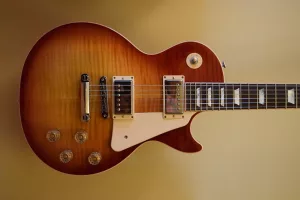
Choosing the best electric guitar for a beginner requires checking off a lot of the same boxes as picking an acoustic. You’ll want something built well that sounds great when it’s plugged in and feels as good as it sounds. Oh, and let’s not break the bank either.
Remember when we mentioned those famous electric guitars earlier? Yeah … you don’t want to buy those as a beginner. A Fender Stratocaster or Telecaster, or a Gibson Les Paul or SG? Those are going to run you $1,000 to $3,000 or even more. Fender and Gibson are great brands, but you probably want something closer to that $150 to $600 price range that acoustics have!
The good news: Fender and Gibson each have subsidiaries producing cheaper versions of their famous models. Fender’s brand, Squier, produces Stratocaster, Telecaster, Jazzmaster, and Mustang models, among others. Gibson’s brand, Epiphone, makes Les Paul, SG, and Melody Maker models.
Of course, you don’t need a Fender/ Squier or Gibson/ Epiphone guitar. There are countless other brands to choose from. We recommend looking at any of these established, trusted brands, reading some reviews, and finding the perfect electric guitar for you:
- Danelectro
- Epiphone
- ESP
- G&L
- Gretsch
- Guild
- Ibanez
- Jackson
- Schecter
- Squier
- Sterling by Music Man
- Yamaha
Electric guitar amps for beginners
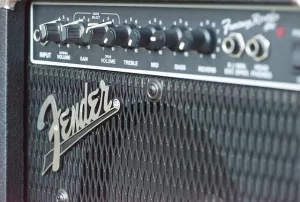
If you’re going the electric guitar route, you’re also going to need to explore guitar amps for beginners, too. And unfortunately, this isn’t going to be a cheap endeavor. Guitar amps for beginners start at $200, and most of the really good ones will run you $350 or more. You could end up spending more on the amp than the guitar itself.
There are a lot of factors that go into choosing the best guitar amp for your needs, but most of those factors won’t matter to a beginner. You won’t need an amp that goes louder than a drummer until you’re ready to get into a band, and guitar tone is something you build over time, so how the amp sounds isn’t super important out of the gate.
To this end, we recommend a modeler guitar amp like the Positive Grid Spark 40, Boss Katana, Line 6 Catalyst, Line 6 Spider V, Marshall Code 50, or the Peavey Vypyr X2. Modeler amps “model” the sounds of other guitar amps. Using a modeler allows you to explore different guitar tones and map out which amps (and even pedals, with the Spark 40) you like or dislike.
Only some of these modeler amps will be loud enough to keep up with a band. So if getting together with other musicians is something you can see yourself doing in the future, you may want to take that into consideration.
Also Read: Are music store credit cards worth it?
The best guitar for a beginner is the one you fall in love with!
The guitar market is flooded with great options, whether you’re getting folksy with an acoustic guitar or looking to shred through the feedback on an electric guitar. And hopefully, our guide helped you find the best guitar for a beginner. Not just any beginner, but you specifically!
Let’s wrap this up with a handful of additional hints and tips for aspiring guitarists:
- Don’t worry about what your guitar idols are using. Getting a Fender Telecaster and a Vox AC30 won’t make you play like Jonny Greenwood, and getting a Gibson Les Paul and a Marshall stack won’t make you sound like Jimmy Page.
- Don’t break the bank on your beginner guitar gear. As much as we hope you’ll fall in love with playing guitar, some people simply don’t. And that’s okay! Maybe there’s a different instrument out there for you! But you don’t want to end up with a $1,500 case queen guitar collecting dust in your closet.
- Don’t shy away from used guitars. We all love shiny, brand-new toys. But used guitars can save you a lot of money and might be in perfectly good condition. It doesn’t hurt to check them out. Tell a salesperson that you’re new to guitar and ask for their honest feedback on an instrument that catches your eye. Just don’t let them push you around and upsell you.
- No, acoustic guitars aren’t better to learn on than electric guitars. They’re cheaper, given that you don’t need to buy an amp, but that’s about it. You’ll learn guitar just as well on an electric if that’s what you want, or an acoustic if it’s more your speed.


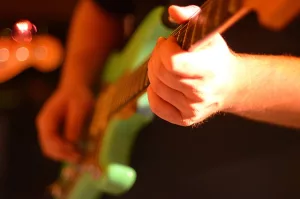
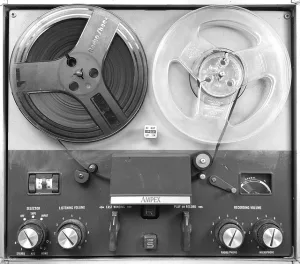
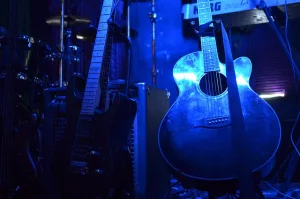
One Reply to “What’s the Best Guitar for a Beginner?”
Comments are closed.